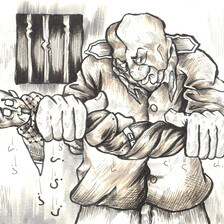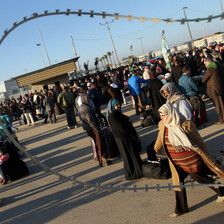The Electronic Intifada 5 June 2013

Hassan Karajah
AddameerFor the first time in more than four months, Hassan Karajah’s father was able to see him this week in an Israeli military court.
The family of the imprisoned activist has been forbidden from attending several of his previous hearings.
Arrested during a night raid in January, Karajah — youth coordinator with the Palestinian organization Stop the Wall — has clearly suffered the effects of being jailed with little access to sunlight and without proper nutrition. His fiancée Sundos Mahsiri said he has lost significant weight and that his skin appeared jaundiced during a recent hearing.
“But his spirit is very strong,” she told The Electronic Intifada. “We weren’t allowed to talk to him, but he told us not to worry as he entered and made victory signs during the proceedings.”
Karajah suffers from a pre-existing nerve condition in his back after he was in a car crash some years ago. At the beginning of his detention, he was completely denied access to his medicine. His family obtained medical forms from his doctor and submitted them to the International Committee of the Red Cross, after which the Israeli Prison Service agreed to provide him with his medicine. But it only gave him one-third of his prescribed daily dosage, according to Mahsiri.
Karajah then decided to stop taking the medicine altogether, Mahsiri explained, because of concerns about hygiene. Addameer, the Palestinian prisoner support group, has documented how other detainees may have contracted diseases as a result of non-sterilized medical equipment being used by personnel working for the Israeli authorities. They include the former hunger striker Thaer Halahleh, who was diagnosed with hepatitis following dental treatment (“Ex-hunger striker contracts hepatitis from Israeli prison clinic,” 22 May 2013).
“Baseless” charges
To date, Karajah has had more than a dozen hearings, most of which lasted no more than five to ten minutes. The Israeli military court handling his case has delayed the delivery of its verdict until 9 July.
Last month, Karajah was charged by Israeli prosecutors with being a member of an “illegal organization,” the Popular Front for the Liberation of Palestine, passing information to Lebanese resistance group Hizballah, and organizing protests on behalf of Palestinian “security” prisoners.
European Union officials were able to attain the exact details of the charges against Karajah and pass on an English translation to Stop the Wall. The allegations included participating in the a student group affiliated with the PFLP at Al-Quds University, distributing flyers and organizing protests, attending a PFLP anniversary commemoration, and meeting a Hizballah operative in Beirut, among a litany of others.
His fiancée Mahsiri argues that the charges were baseless. She believes that Israel targeted him because of the effectiveness of his activism and as revenge for his family history.
Karajah’s sister Sumoud had been given a twenty-year sentence for stabbing a soldier, but she was released after serving two years as part of the October 2011 prisoner exchange deal between Hamas and Israel.
Karajah’s younger brother Muntasser, who was arrested in September 2012, is now serving a ten-month prison sentence for membership in the PFLP. “It’s like they took revenge on his family because of his sister’s release,” Mahsiri said.
Beaten and isolated
After his arrest in January this year, Karajah was denied access to a lawyer for three weeks. His family was prevented from attending his first three hearings.
“For those three weeks, we had no idea where he was, how his health condition was; we had no information at all,” Mahsiri said.
During the interrogation period, Karajah was “hit, interrogated for ten to fourteen hours per day, and was held in solitary confinement in a small cell — about one meter wide and two meters high,” Mahsiri added.
Jamal Juma’, director of Stop the Wall, echoed the belief that the charges against Karajah were strictly politicized attempts to stifle Palestinian campaigners. “Anyone who travels abroad a lot, especially to Lebanon, and meets with Arabs, will be chased [by Israel] and probably accused of working with Hizballah,” he told The Electronic Intifada.
“We’ve all been arrested”
Juma’ said that Stop the Wall had been targeted because it has exposed Israeli human rights abuses and land theft, and cultivated international solidarity. Stop the Wall has also been a vocal proponent of the Palestinian call for boycott, divestment and sanctions (BDS) against Israel.
“We’ve all been arrested,” said Juma’, who has also been arrested twice for similar charges. A total of five youth members of the Stop the Wall campaign are currently detained in Israeli prisons, and several others working with the organization face the threat of arrest.
The group’s offices have been raided twice by the Israeli military, once in February 2010 and again in June 2012.
To preserve its system of domination, Israel enforces a fractured political geography on Palestinians by regularly targeting activists, intellectuals and entire organizations. One of the biggest factors behind Karajah’s arrest, according to Juma’, is his history of organizing solidarity events on behalf of Palestinian prisoners.
“The prisoners have been huge for Palestinian unity, and Israel doesn’t want to see any mass mobilization like this,” said Juma’. “Any attempt to bring people together across parties — Israel wants to smash it. Any leader, they will get him.”
According to Juma’, Israeli interrogators use spurious claims of affiliation to Hizballah to pressure activists into giving up information about peaceful movements against the occupation. During his own interrogation, he said, Israeli intelligence squeezed him for information about Stop the Wall and names of activists involved in the BDS campaign — which Israel calls the “de-legitimization movement.”
“There’s no logic in their racism,” he said. “Their courts and laws are in favor of their political goals. Illegal settlers who attack Palestinians and destroy olive trees on a daily basis are not questioned, but Palestinians like Hassan, who choose a peaceful route, are imprisoned.”
Patrick O. Strickland is a freelance journalist whose writing has appeared at Al Jazeera English, GlobalPost, Al Akhbar English, and elsewhere. Follow him on Twitter @pstrickland.





